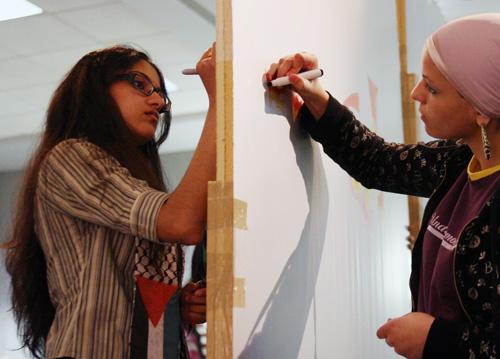Cafe Intifada expresses discontent about military occupations

Samiyah Nageeb junior in LAS, left, and Nada Youssef, freshman at Parkland, right, express their emotions on a wall representing the border wall being constructed by the Israelis on Palestinian land during Cafe Intifada at Allen Hall on Thursday, April 3, Jeremy Berg
Apr 4, 2008
Last updated on May 13, 2016 at 09:22 a.m.
In the Friday April 4 edition of The Daily Illini, Jeffrey Gross, quoted in the article “Cafe Intifada expresses discontent about military occupations,” should have been identified as an Illini Media Company employee.
The Daily Illini regrets these errors.
The following is the story as it appeared in print that day.
Students for Justice in Palestine sponsored a night of spoken word, music and visual art meant to express discontent with the idea of occupation in Palestine and elsewhere on Thursday evening. The group called the event “Cafe Intifada,” an Arabic word for “shaking off” or “rebellion.”
Get The Daily Illini in your inbox!
“Intifada means to express displeasure toward something,” said Dana Al-Qadi, freshman in LAS and president of Students for Justice in Palestine. “You make a commotion about it, you don’t just sit there and take it. And tonight, we’re going to do something about it.” Attendees expressed their discontent through poetry and an open mic session. The group also set up two tall, gray movable walls in the middle of the room to mimic the apartheid wall in Palestine. Al-Qadi said the wall was built by Israel on Palestinian land. Students were allowed to write on this wall to express their concerns.
“It symbolizes all walls that are built and all walls that crumble,” said Nader Abusumayah, 2006 University alumnus and emcee for the evening. Aside from its translated meaning, the word intifada represents two periods of Palestinian opposition to Israel’s military presence in the area. Al-Qadi said the first intifada began in 1987 and was mainly composed of nonviolent forms of rebellion including civil disobedience and graffiti. The second intifada represents the current conflict between Israel and Palestine. This connotation caused Jeffrey Gross, senior in LAS, to be concerned with the event’s name.
“When it’s used in the context of Israel, it refers to a violent rebellion of terrorist attacks,” Gross said. “This could be a great event where people talk, but as great of an event as it is, you can’t promote it under this guise.”
Gross said he and a number of his Jewish friends were concerned with the negative connotations of the word intifada. He attended the program to make a statement during the open mic part of the night. Gross said that when he got his turn to speak, he was booed and had to pause until Al-Qadi and other program organizers silenced the crowd and allowed him to continue. He also said that others at the event confirmed his fears about the negative connotations of the word intifada by accusing the Jewish people of being terrorists.”(Intifada) means a struggle to liberate people,” said Samiyah Nageeb, junior in LAS, who read three poems at the event. “I’m sure Westerners can hear it and think of terrorists and crazy Palestinians and there’s lots of propaganda to lead people to take this the wrong way.” Events like Cafe Intifada should be allowed to occur to foster education and understanding, said Laura Haber, program coordinator of Unit One, the living-learning community at Allen Hall. “It’s important that Allen Hall be a safe environment for everyone,” Haber said. “As part of this University we need to engage with different ideas, even if they make us uncomfortable.” Gross, however, said the name of the event made him feel unsafe. He spoke to Haber before Thursday’s program and asked for the name to be changed, but Haber said it was too late. Al-Qadi said the second annual Cafe Intifada was planned for the fall, but was postponed due to logistical reasons.
“I hope people kind of get that the whole point is unity,” Nageeb said. “One nation’s problem is another nation’s problem and there are similar struggles in different nations.”





